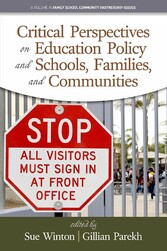Suchen und Finden
Service

Critical Perspectives on Education Policy and Schools, Families, and Communities
Sue Winton, Gillian Parekh
Verlag IAP - Information Age Publishing, 2020
ISBN 9781641138819 , 241 Seiten
Format PDF
Kopierschutz DRM
Geräte
Critical Perspectives on Education Policy and Schools, Families, and Communities offers scholars, students, and practitioners important new knowledge about how current policies impact families, schools, and community partnerships. The book’s authors share a critical orientation towards policy and policy research and invite readers to think differently about what policy is, who policymakers are, and what policy can achieve. Their chapters discuss findings from research grounded in diverse theories, including institutional ethnography, critical disability theory, and critical race theory. The authors encourage scholars of family, school, and community partnerships to ask who benefits from policies (and who loses) and how proposed reforms maintain or disrupt existing relations of power.The chapters present original research on a broad range of policies at the local, state/provincial, and national levels in Canada and the USA. Some authors look closely at the enactment of specific district policies, including a school district’s language translation policy and a policy to create local advisory bodies as part of decentralization efforts. Other chapters reveal the often unacknowledged yet necessary work parents do to meet their children’s needs and enable schools to operate. A few chapters focus on challenges and paradoxes of including families and community members in policymaking processes, including a case where parents demonstrated a preference for a policy that research demonstrates can be detrimental to their children’s future education opportunities. Another set of chapters emphasizes the centrality of policy texts and how language influences the educational experiences and engagement of students and their families. Each chapter concludes with a discussion of implications of the research for educators, families, and other community partners.
Shop


